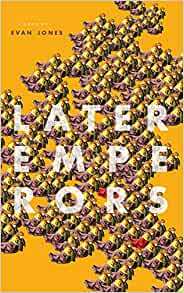Review of Later Emperors by Evan Jones, pub. Carcanet 2020

This collection contains three sequences and one long poem, all set in the ancient world. The first sequence, Later Emperors, concerns late and mostly little-known Roman emperors: potted biographies that usually focus on one small, often moving, detail. If that sounds familiar, it should: reading these little poems, as I discovered to my growing delight, one would think Cavafy had come back to life especially to write them. I don’t for a moment think the echoes of his style are any accident. One need only read “Maximus and Balbinus”:
Our lives are like those of Maximus and Balbinus:
the unfortunate soldier and the hapless noble,
two emperors, alone in the palace, a troop
of assassins approaching, while the city
enjoys the Capitoline games.
or “Tacitus”:
Tacitus is too old now. His patience,
his wisdom, could not better
the blood-letting of war. On his death-bed,
the army camped in remote Tyana,
he remembers his garden, his villa,
his morning stroll – life a few months ago –
and in his suffering he curses
the Senate, the godawful Senate.
It is as if Jones had decided there was really only one voice these poems could be written in and had accordingly resurrected it for the purpose.
That suits me, because I can’t get enough of that voice. What I don’t entirely get, however, is the assertion on the back cover and in some reviews that these Later Emperors are conceived as a mirror of the present and “resemble the tyrants of our own time”. I don’t think they do, especially. They range from the inept to the deeply unpleasant, but in what age did rulers not? I would accept that their little biographies show the repetitions of history — as the Earl of Newcastle wrote to his pupil Charles I, “what you read, I would have it history that so you might compare the dead with the living; for the same humours is now as was then, there is no alteration but in names”. But I don’t see anything especially contemporary in them.
The second and third sections deal with the Byzantine chroniclers Michael Psellos and Anna Komnene. Some extensive background reading on both has not quite convinced me I get exactly what these poems are trying to do. In particular I don’t understand the purpose behind the form of the Michael Psellos poems. These are in longish lines, roughly alexandrine, each with a huge break in the middle which you can’t really call a caesura, since they often occur at seemingly random places where no one would naturally pause. It might be trying to reflect the uncertain nature of Michael’s life and career, serving a succession of volatile and unreasonable emperors, but I’m really not sure. The Anna poems are brief journal entries, graceful enough moments but somehow slight and insubstantial for such an intellectual powerhouse of a figure.
The last section; “Coda: Plutarch To His Wife” is a long poem inspired by Plutarch’s “Consolatio Ad Uxorem”, written on hearing, while away on his travels, of his daughter’s death. It is not a translation of that letter; in fact what it reads like is a first draft for it, abandoned when Plutarch realises he is wandering from what he meant to write. This is a promising idea, and movingly executed, as Plutarch continually strays into unrelated details, away from the subject his mind does not want to confront, and just as inevitably returns to it. Its cadences are measured and memorable; its preoccupations, obviously, universal:
I can see not too far off
the outline of our closeness,
and the ways in which that fades,
unfurling us as so gently in the wind one’s
eyes are closed and soon enough
another leaves and what little happiness
there was separates and weighs
on the living rest. Life is made thin
and there is so much in the grave past
and graver future.
What it comes down to is that I like the first and fourth sections of this collection very much, find the third a bit meh and cannot really work out yet what he is getting at in the second. I also have some reservations about his undoubted ability to coin memorable-sounding phrases. Some of these do stand up to examination but some, when you ask yourself what they actually mean, rather fade. I’m not sure this collection, as a whole, quite merits some of the rave reviews it got in the press, but half of it certainly does.



